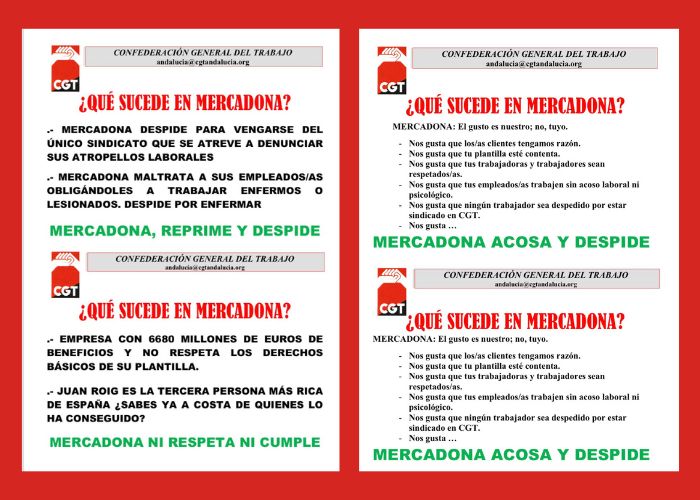labMADRID – Usually we hear nothing but good about the supermarket, where the majority of Spanish consumers do their shopping. Mercadona has been the largest supermarket chain in Spain since 2009. However, now, it seems the company could be sectarian and subject its staff to harassment and labour abuse.
CGT Andalucía calls on consumers to boycott the Mercadona supermarket on Wednesday, November 16. A previous boycott took place on November 4 across Andalucia. This call follows the latest reports of cases of harassment and labour abuse, writes El Salto* newspaper.
“Mercadona mistreats its employees”
CGT claims that “Mercadona fires to retaliate against the only union that dares to expose its labour abuse violations”. The poster announcing the actions also read: “Mercadona mistreats its employees by forcing them to work sick or with injuries, and fires them because they are sick”.

In 2021, with 96,000 employees, the company reached 25% of the market share in the sector. That figure is far from that of Carrefour, the second market leader in the country. They have 9% of the market share. That same year, the supermarket made a net profit of €680 million. Mercadona is also one of the companies with the highest turnover in all of Spain outside the food sector.
Although Mercadona is integrated into the daily life of the population, founder and CEO, Juan Roig, is very rarely seen in public. The fourth richest man in Spain, according to Forbes, refuses to give interviews and only comments on the annual figures.
Clear media strategy
In recent years, however, Mercadona has had a very clear media strategy: through “hidden” advertising for its products to continuously appear positively in the media. Just search for ‘Mercadona’ and almost every day there are jubilant messages about the launch of new products or the positive effects of the company’s economic activity. This year, the supermarket was named by Merco as the company with the best reputation in Spain.
It is almost impossible to find critical news about Roig’s company, as is the case with other large national companies such as El Corte Inglés. It is also striking that the message about this boycott was only adopted by El Salto. No other Spanish newspaper mentions it. The scrupulous concern for the image is the guarantee of its hegemony. According to the company, “Mercadona is a company involved in the objectives of the society.”
The lack of a critical stance on the part of the media, the emphatic presence across the country and an always positive presentation on the part of the company make for an unshakable image. The general idea about Mercadona is that it is one of the companies that treats its employees the best. It now appears, according to El Salto, that many testimonials give a different reality that is less positive.
Day of struggle against Mercadona’s labour policies
Although business dynamics are nationwide, there have been several cases of labour abuse and harassment in Andalucia in recent years leading to this call for a boycott of the supermarket. That boycott is organised by the trade union CGT Andalucia for today, Wednesday 16 November. “A day of struggle against Mercadona’s labour policy, which fires and psychologically attacks both workers and their families,” they say from the union. On the day of the boycott, actions will be carried out at various locations throughout Andalucia.
“Done Accepting Abuse”
“We want to make visible what Mercadona does and also make employees aware that they should not keep their mouths shut, that at some point they are done accepting abuse. By forcing things like them to go to work when they’re sick; making reconciliation of work and family almost impossible and that those who dare to claim their rights have to resort to courts,” said Miguel Montenegro, general secretary of CGT Andalucía.
Dismissal strategy
The boycott day falls one day before the judicial conciliation procedure of the last case represented by the union. Martín, a Mercadona employee from La Carolina (Jaén), is suing that he was fired because he has a relationship with the secretary of CGT Andalucía, Ceuta and Melilla. “We are going to defend tooth and nail the invalidity of the dismissal,” says Montenegro, “they always use false disciplinary dismissal”.
This layoff strategy has been used by the company several times, according to CGT. A modus operandi justifying dismissal for disciplinary reasons and recognising in any legal proceedings the unfairness of that dismissal. The spokesman for CGT Andalucía says: “Thanks to the non-labour reform of [labour minister. ed.] Yolanda Díaz, they still do not have to pay a salary during proceedings, even if the dismissals are unfair”.
Last August, in Almuñécar, Adela Olivares and Salvador Pagés, two workers who worked at Mercadona for more than 20 years, were unfairly dismissed “after so many years of carrying boxes of fruit and cutting sausages”, as they noted in the meeting organised in front of the branch by residents. “Mercadona don’t want older workers, that’s why they use disciplinary dismissal after years of getting everything out of someone,” says Miguel Montenegro.
Forced to work while on sick leave
Lolo Lorenzo worked at Mercadona until August 2020, when he was fired “due to limitations in my musculoskeletal system”, he notes. At the end of 2019, he was diagnosed with several hernias. After several days of sick leave, Mercadona and the health insurance company, Fremap, “were putting pressure on me to fire me even though I hadn’t recovered yet,” says Lorenzo. The pressure continued for months, even though the employee was still disabled and had to undergo several surgeries. Lorenzo was forced to go back to work. Finally, Lolo Lorenzo gets another sick leave due to a common illness. “I lugged 11,000 kilos a day from Monday to Saturday for 16 years, these hernias are not inherited from my mother,” says the worker.
At the beginning of 2020, his wages were no longer paid during his sick leave. Mercadona justified this since he had missed a medical examination. He would have received the notification for this through his son. “They said that the report was received by my son Manuel Lorenzo. But my son has a different name and is eight years old. Therefore, that is not possible.”
No pay for over a year
For more than three years, both Fremap and Mercadona have made Lorenzo’s life difficult by using different strategies. “It was impossible to contact them for a while, they lied and left me without pay for over a year. My retired father then had to help me and my family,” said Lorenzo.
On January 9, 2023, the workers’ trial against both companies will take place. The ex-employee claims his case is not an isolated one of the company’s treatment of its staff, but that it “bought the media and institutions”. His case came out on Canal Sur “but they only let me talk about the complaint with the Fremap company. They forbade me to use the word Mercadona.”
Labour abuse as part of the company’s DNA
“Bad labour practices are part of the company’s DNA,” according to CGT Bizkaia. There are cases of sexual harassment (in Valencia in 2015). Trade union repression in 2013 at Francisco Enríquez who works for Mercadona in Malaga. He was fired for being part of the CGT. Three cases of labour abuse in Fraga in 2013. These cases rarely make it to the media and society. The silence is due to fears of possible retaliation the company could take against employees and former employees. In addition, everyone must sign a clause in which they promise not to disclose confidential information.
The customer is the ‘boss’
This obligation is in line with other issues in the supermarket company’s code of conduct. These range from banning tattoos to designating customers as ‘the jefe (the boss). That attitude can lead to discrimination in the ranks of the employees against different people for reasons of diversity. “You will never see an employee at Mercadona who has a different racial background,” says Miguel Montenegro.
El Salto
*El Salto is a journalism project made up of 200 people and more than 8,000 partners committed to radically different journalism: unfunded from Ibex35 companies, democratic, decentralised and collectively owned. When you join, you make it possible for El Salto to survive and reach more people with better content.


